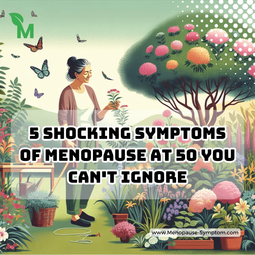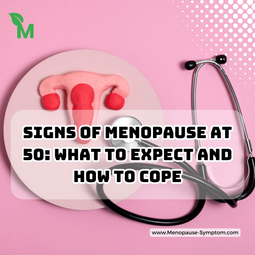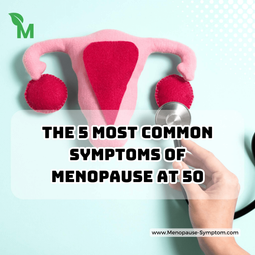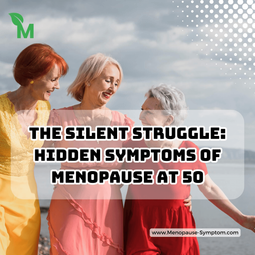Age 50 Menopause Symptoms: What To Expect And How To Cope
On
28/10/2024Reading time:
5 min
Summary:
Discover the most common menopause symptoms at age 50, including hot flashes, mood swings, and sleep disturbances. Learn effective management strategies and when to seek professional help.
Navigating the Change: Age 50 Menopause Symptoms and How to Thrive
The Midlife Transition: Understanding Menopause at 50
As women approach their 50s, they often find themselves at the doorstep of a significant life transition: menopause. This natural biological process marks the end of reproductive years and brings about a host of changes. While every woman's experience is unique, understanding age 50 menopause symptoms can help you navigate this journey with confidence and grace.
Common Age 50 Menopause Symptoms: What to Expect
Hot Flashes: The Heat is On
One of the most notorious age 50 menopause symptoms is the hot flash. Imagine suddenly feeling an intense wave of heat washing over your body, often accompanied by sweating and a rapid heartbeat. These episodes can be unpredictable and occur at any time of day or night.
"Hot flashes are like your body's personal summer, arriving unannounced and overstaying their welcome."
Night Sweats: Midnight Meltdowns
Closely related to hot flashes, night sweats can disrupt your sleep and leave you feeling exhausted. Many women in their 50s report waking up drenched in sweat, necessitating a change of pajamas or bedsheets.
Mood Swings: The Emotional Rollercoaster
As hormone levels fluctuate, you might experience mood swings that can feel like an emotional rollercoaster. One moment you're feeling fine, and the next, you're irritable or tearful for no apparent reason.
Vaginal Dryness: The Silent Symptom
A less discussed but equally important age 50 menopause symptom is vaginal dryness. This can lead to discomfort during intercourse and may affect your intimate relationships.
Weight Gain: The Battle of the Bulge
Many women notice changes in their body composition as they enter menopause. Weight gain, particularly around the midsection, is a common complaint among women in their 50s.
Beyond the Basics: Lesser-Known Menopause Symptoms
While hot flashes and mood swings often steal the spotlight, there are other age 50 menopause symptoms that deserve attention:
Thinning hair and dry skin
Loss of breast fullness
Increased urinary tract infections
Changes in libido
Joint pain and muscle tension
Coping Strategies: Thriving Through Menopause
Now that we've outlined what to expect, let's explore effective ways to cope with age 50 menopause symptoms:
Lifestyle Modifications: Your First Line of Defense
Stay active: Regular exercise can help manage weight, improve mood, and reduce hot flashes.
Eat a balanced diet: Focus on whole foods, lean proteins, and plenty of fruits and vegetables.
Practice stress reduction: Try yoga, meditation, or deep breathing exercises to manage stress and mood swings.
Dress for Success: Managing Hot Flashes
Layering your clothing can help you quickly adapt to sudden temperature changes. Opt for breathable fabrics like cotton and keep a small fan handy for quick relief.
Sleep Strategies: Combating Night Sweats
Use moisture-wicking sheets and pajamas
Keep your bedroom cool and well-ventilated
Avoid triggers like spicy foods or alcohol before bedtime
Nurturing Intimacy: Addressing Vaginal Dryness
Don't let vaginal dryness impact your intimate relationships. Consider using water-based lubricants or speaking with your healthcare provider about vaginal moisturizers.
The Power of Support: You're Not Alone
Remember, millions of women are going through the same experience. Joining a support group or confiding in friends can provide emotional support and practical tips for managing age 50 menopause symptoms.
When to Seek Help: Partnering with Your Healthcare Provider
While many age 50 menopause symptoms can be managed through lifestyle changes, there are times when medical intervention may be necessary. Don't hesitate to consult your healthcare provider if:
Your symptoms are severely impacting your quality of life
You're experiencing heavy or irregular bleeding
You have concerns about your bone health or heart disease risk
Your doctor can discuss various treatment options, including hormone therapy, non-hormonal medications, or alternative therapies tailored to your specific needs and health history.
Embracing the Change: A New Chapter Begins
As you navigate the waters of menopause in your 50s, remember that this transition, while challenging, also marks the beginning of a new chapter in your life. Many women report feeling a sense of freedom and empowerment post-menopause.
"Menopause is not the end of the road; it's the start of a new journey filled with wisdom and opportunity."
By understanding and proactively managing age 50 menopause symptoms, you can not only cope but thrive during this transformative time. Embrace the changes, listen to your body, and don't be afraid to seek support when needed.
Conclusion: Your Menopause Journey
As we've explored, age 50 menopause symptoms can vary widely from woman to woman. By arming yourself with knowledge and adopting a proactive approach to your health, you can navigate this transition with confidence and grace. Remember, menopause is a natural part of life's journey, and with the right tools and support, you can emerge stronger, wiser, and ready to embrace the years ahead.
Whether you're just beginning to experience symptoms or are well into your menopause journey, know that you have the power to shape your experience. By implementing the coping strategies discussed and working closely with your healthcare provider, you can minimize the impact of age 50 menopause symptoms and focus on the exciting opportunities that this new phase of life brings.
Embrace the change, celebrate your journey, and look forward to the wisdom and freedom that come with this new chapter in your life. You've got this!
Source: Team MPS compiled, analyzed and wrote. Please dont reup without source of us. Many thanks.




